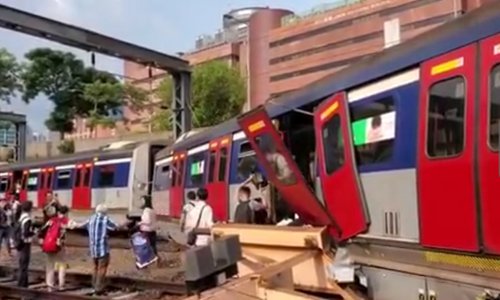
Passengers leave the derailed MTR train on Tuesday morning. (Photo: Screenshot of video from Sina Weibo)
Eight passengers were injured when a train derailed at Hong Kong's Hung Hom Station on Tuesday morning, causing MTR services from the station to Mong Kok East Station to be suspended.
Five of the eight injured were hospitalized and some 400 passengers were evacuated, according to Hong Kong Fire Services at a press conference on Tuesday.
Alfred Sit Wing-hang, Director of Electrical and Mechanical Services, said at a press conference after the incident that the MTR will investigate the derailment thoroughly, which may take three to six months.
A crack was found on the track after the incident, Sit said, noting it is unclear whether it was the cause of the derailment or was created after the accident.
Amid speculation that the incident was caused by people throwing blocks onto the track, Secretary for Transport and Housing Frank Chan Fan said that they have not ruled out any possibilities and declined to speculate on possible causes.
It was the first time a MTR carrying passengers has derailed in Hong Kong as unrest in Hong Kong entered their 15th week.
"We are concerned and saddened by the incident," Hong Kong Federation of Railway Trade Unions told the Global Times on Tuesday.
Some passengers speculated that a railway switch had somehow malfunctioned.
Others speculated that the derailment may be the work of radical protesters.
In early September, as rioters vandalized the entrance to MTR stations, bicycles were found being placed on train tracks and over electric cables near the train platforms, according to local media reports.
MTR officials have not yet determined the cause of the derailment, but quickly arranged buses for commuters to relieve congestion from New Territories to Kowloon.
Some radical protesters cheered the derailment, saying the MTR system is the "frontline" of their so-called non-cooperation movement, which aims to disrupt public transportation and hinder people from getting to work on time, according to online discussions on the social media platform LIHK.


